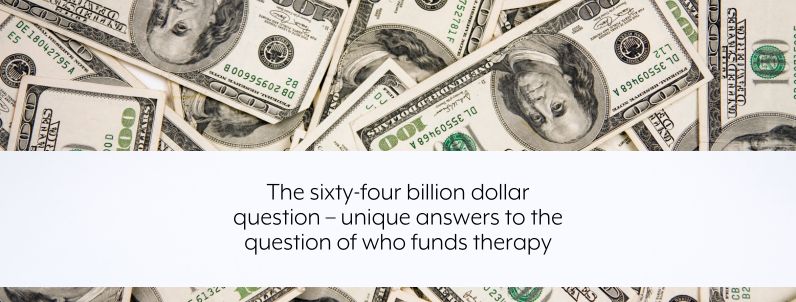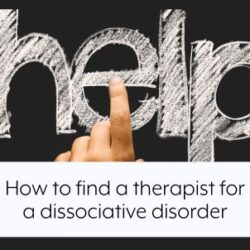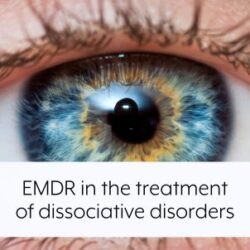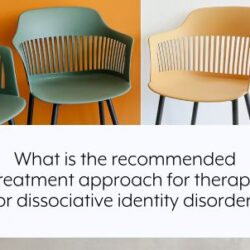
If there’s one thing I’ve realised over the last few years of working in the field of dissociative disorders, it’s that no two survivors are the same. At any of the training events at which I’m speaking, I guarantee that at some point – usually at several points – I will use the word ‘unique’. And that’s a funny word in and of itself. Often it’s loaded. It can be patronising, or bear a hidden but thoroughly ill-intentioned meaning of ‘odd’. But I don’t mean unique like that. I mean something very affirming, and something very intrinsic to understanding dissociative disorders.
I mean that you cannot herd up a group of ‘dissociative identity disorder people’ or ‘dissociative survivors’ or whatever other collective phrase we invent, and spray-paint them as sheep, with markings on the side that say ‘dissociative identity disorder– treat all the same’.
I reckon working with dissociative identity disorder must be at least a little bit scary. And when we’re scared, we all have a tendency to become ever so slightly black-and-white about things, and we lose the tolerance to identify nuances and shades of grey. But if that is our approach to dissociative disorders, we risk being a source of retraumatisation or at least of dehumanisation, which I’d suggest is the core experience of abuse that led to us being dissociative in the first place.
How are survivors of dissociative identity disorder treated?
People treated me as less than human – far, far less than human – and that treatment, that objectification, that scandalous disregard of my human rights, my feelings, my desires, my choices, my sense of self and dignity and respect … that is what has led me to having this fractured, splintered series of mental/physical states that comprises being dissociative identity disorder.
So we’re on dangerous ground if we lose sight of the fact that the dissociative identity disorder person in front of us is a unique human being whose sense of humanity needs to be restored.
And it is from that viewpoint that I consider the sixty-four-billion dollar question posed to me on a weekly, even a daily basis: how do I get treatment?
In Utopia, it would be a simple trip to the empathic, well-informed GP who would refer you on immediately (preferably same day) to a consultant who is aware of power dynamics and how frightening and destabilising that can be for you, and who considers you to be the expert on you, and that he or she is there merely to guide and assist.
Then, courtesy of the Utopian Health Service, you would be offered one, maybe two, sessions of suitable length per week with a local psychotherapist who is experienced in working with dissociative disorders (and doesn’t take more than four weeks’ holiday per year and is never sick), who is able to offer you a perfect blend of attachment-based individual psychotherapy utilising up-to-date resources, techniques and modalities such as Sensorimotor Psychotherapy, and lasting as long as you need it.
There would then perhaps be follow-up services – counselling or other support for your partner if you have one, a knowledgeable prescribing doctor who can help you with short-term crises or with areas of difficulty such as insomnia or pain, without giving you anything that will dull the limbic system to such an extent that you are unable to engage with therapy. And perhaps help with the costs of transport, perhaps a home help if you are physically disabled as a result of either the dissociation or the trauma itself, support for your children if you have any, dentists and opticians and family planning nurses and all sorts of NHS staff who are knowledgeable about dissociation and trauma and who work sensitively and effectively with you to help you access all aspects of healthcare without it being retraumatising.
Ah yes, Utopia.
If this were a TV programme, there would be a jolting screech and we would be transported suddenly and traumatically back into here and now by a patronising voiceover: ‘Er, no … reality is the current state of knowledge and understanding today in this country, and in the NHS in your region.’
And let’s think for a moment about that issue of uniqueness. What I need from the NHS might be very different from someone else. At times in my life I have been in a wheelchair, but I have not been for some years now. But I know people with dissociative identity disorder who are bed-bound, house-bound, wheelchair-bound. The Utopic vision of NHS healthcare provision would have to take into account the fact that some people with dissociative identity disorder end up in wheelchairs, while others do not. I use that example because it is a visually obvious one, and if you have ever been in a wheelchair you will know how different the world seems from waist-height and you will realise that there are a lot of other issues for you as a dissociative identity disorder wheelchair user than for a leg user.
Back to the big money question. how do we access treatment?
I have had very little help from the NHS. My doctor had never heard of dissociative identity disorder but she didn’t have a power thing going on and was willing to learn from me. That learning hasn’t yet got as far as her being able to even spell dissociation, but she prescribes me whatever I ask for, and we seem to have a unique, respectful relationship.
A few years ago as bank accounts were dwindling and the realisation set in that this was going to be a long-haul flight, I considered trying to get NHS funding to pay for my twice-weekly therapy which to date had set us back £10,000. And to cut a long story short, I didn’t get very far with it. I was faced with a choice to either battle with my trauma – trauma which monopolised all my resources at the time just to get through each day – or battle with the NHS. And another aspect of life with dissociative identity disorder arose at the same time, namely that of a police investigation against my perpetrators. I couldn’t fight on all fronts. So the NHS battle was never fought.
But I am unique. I am in a unique relationship with the therapists I have worked with. I am in a unique relationship with my GP. I am in a unique position in terms of what is or isn’t in my bank accounts. I am not saying that other people don’t have similar circumstances, but I have yet to meet anyone else who was abused exactly as I was within the same relational milieu, with the same outcomes, the same ensuing life story, the same partner/spouse or lack thereof, the same current life situation.
So when people ask me, ‘Should I try to get the NHS to fund my therapy?’ what can I say? What is your unique position? What is your unique set of characteristics and traits and experiences and aspirations and difficulties, and what is the unique situation of your GP and your local NHS Primary Care Trust? What is the unique set of circumstances that is your battle, and are you able to marshal your resources towards the battle with the NHS?
I have carried a lot of guilt for paying for my own therapy. There are things that both I and other people went without because of it. Sometimes I feel that maybe I would feel more as if I am ‘proper dissociative identity disorder’ (that elusive and nebulous status) if my condition were validated by a diagnosis by an NHS Consultant Psychiatrist. Sometimes I feel that I would feel better about myself if society in the form of the NHS took some responsibility for what happened to me and were putting it right. Sometimes I feel angry that 16 and 17 years olds can be paid £30 a week to stay in education (which will ultimately benefit them anyway) while I even have to pay for my prescriptions and receive absolutely no help at all from the Government for the effects of a multitude of crimes committed against me.
I listen in agony sometimes to the stories people tell me of their treatment within the NHS, of dehumanising assessments and dissociative care plans which serve only to destabilise them further and significantly lower their self-esteem. Many are the wounds of people who have fought that battle. I seethe with anger at the treatment of these dear people who are only trying to become human again and yet seem to be blamed and vilified for crimes committed against them. There are hoops to jump through, hoops and hoops and more hoops. But the last time I looked, that was an activity more appropriate for dogs at school fêtes than traumatised people. What some people with years of experience in this field say – ‘If you can afford to steer clear of the NHS, do so’ – seems to me to be wise advice indeed for these people.
But there are the people who cannot afford it and they have no choice but to battle. And some succeed. I cannot measure the cost to them, because after all they too are unique. When I hear of people after many long years securing treatment funded by the NHS at the Clinic for Dissociative Studies, I rejoice. Can I suggest to everyone who contacts us or asks us what to do that this is the right course of action?
What of the issue of people who have therapy funded for 12 months and after 12 months they must ‘prove’ that they need it to continue? How does that leave the attachment to the therapist, with this Damocles’ sword of funding hanging over their heads? How can we really seek wellbeing if gaining some degree of it will potentially remove the support and the attachment relationship that we need in order for wellbeing to be a permanent and not a temporary state? I imagine the threat of ‘termination of provision of services’ would cause a huge sense of internal ambivalence. At least it would for me, but then again I am unique … I suspect that 12 months of ambivalence is better than 12 months of nothing.
Is the NHS populated with power-crazy psychiatrists who refuse to believe in the existence of DID or (for those who accept its reality) refuse to talk to parts? Yes and no. Even people who work in the NHS are unique. I have met a great many of them who are wonderful people seeking to provide the very best therapeutic care to their patients. But they are unique too. I heard one story that dissociative identity disorder exists in the eyes of the NHS in West Sussex, but not East Sussex. So Primary Care Trusts are unique too.
When I talk about how I am relieved that I have avoided the battle with the NHS, people tend to hear it one of two ways. There are those, many of whom email me afterwards, who are grateful for what they see as the validation of the choice that they too have made. People may think that those who are paying for private therapy do so because they can afford it, but I’ve come to realise that many cannot afford it. And for some there is huge guilt at the sacrifices they are having to make in other areas of their life, especially when there are children involved and their self-funded therapy means that there are literally no presents at Christmas.
Then there are people who feel that I am somehow saying that it is wrong, or foolish, to pursue NHS funding. That is not at all what I am meaning. I applaud the courage and tenacity of people who have often fought for years to secure funding. Some do it for themselves, some do it for their partners or other family members. Every person that secures funding helps not only their own situation but also raises awareness in the NHS as a whole, and that is a laudable achievement for which everyone should be grateful.
My caution about the NHS route is simply because unless people realise that it is going to be a battle, the wounds from it can be overwhelming, and my heart aches at the thought of anyone who has a trauma background similar to mine being wounded again in any way. I guess I just wish it did not have to be so. When people caution against the NHS route, it comes out of a desire to protect people from further hurt, not because it will inevitably be unsuccessful. People do fight and do manage to secure treatment, and often it is the people who give everything to this battle because they know it is their only option who are successful. There are distinct advantages to self-funding therapy, such as control and a degree of security and all it takes to start is a phone call and an appointment. But there are costs and disadvantages too.
So everyone is unique. Every person who works in the NHS is unique. Every Primary Care Trust, every mental health department, is unique. And everyone’s battle for treatment will be unique. That’s why the sixty four billion dollar question remains unanswered.



1 Comment
Having just read this Blog and about the NHS and as it has changed over the years it brings to mind part of my own story which may or may not be relevant. Everything came to a head for me in 2001 when I was unable to manage my volcanic anger towards my young children. The trigger being ‘not be heard’ and the fear that I was changing into my father. With support which pointed me in the right direction, I commenced the long road of therapy. The first lot lasted 10 years which cost £12,000. Years later someone asked if I had tried to get it back. Social services here I come. Working with solicitors at the cost of £2000 plus it came to a halt, because the Social Services ‘kept families together in those days’, regardless of what was going on behind closed doors and being known about. CICA has now been brought to my attention, which myself and especially my sisters are persuing to at least get some acknowledgement that we matter now as did then. If you don’t think this is a relevant comment to your Blog I understand, it has however helped me to get it down in typing. Thank you so much Carolyn for the work you do.